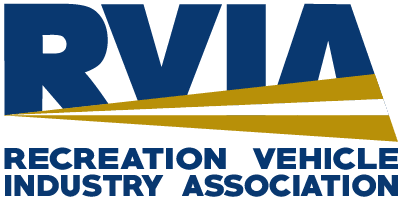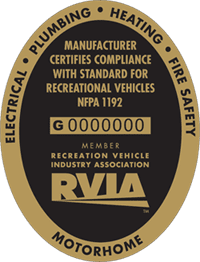What Is RVIA Certification? (and Why It Matters for Your Horse Trailer)
Not all living quarters horse trailers are created equal. Some are handcrafted to national safety and quality standards. Others? Thrown together without oversight, and built to cut corners.
That’s where RVIA certification comes in.
If you’re planning to build a custom living quarters trailer, or even thinking about buying one used, RVIA certification should be on your radar.. It can impact your safety, your insurance, your ability to stay at RV parks, even your trailer’s resale value.
Let’s break it down.
What Does RVIA Certification Actually Mean?
RVIA stands for the Recreational Vehicle Industry Association, a national organization that sets safety and construction standards for the RV industry.

When a horse trailer’s living quarters are RVIA-certified, it means they’ve been built to meet strict codes for:
- Electrical systems
- Plumbing and water tanks
- Propane gas systems
- Fire safety
- Egress and emergency exits
- Ventilation, insulation, and structural safety
Important: RVIA certification only applies to the LQ area, not the horse compartment itself. That’s where our own innovations (like SafeTack®, SafeBump®, SafeKick® and Z-Frame® construction) take over.
Why RVIA Certification Matters More Than You Think
It’s easy to get distracted by slide-outs and leather upholstery. But behind all that glamor, you should be asking: Was this trailer built to code or just built to look good?
Here’s what RVIA-certified living quarters give you that uncertified builds can’t:
1. Proven Safety
No guesswork. Every wire, pipe, appliance, and vent is installed according to national RV safety codes.
2. Easier Registration & Insurance
Many states require RVIA certification for RV registration and some insurance providers require it to write full coverage.
3. More Resale Value
Savvy buyers (and dealerships) know the difference. RVIA certification adds credibility and long-term value.
4. Guaranteed Access to RV Parks
RVIA stickers are often required at private campgrounds, national parks, and state fairgrounds. No sticker? No stay.
5. Peace of Mind
You’re investing in a space you’ll sleep, cook, and relax in. RVIA certification gives you the confidence that every system meets strict national safety standards.
Is RVIA Certification Required for Horse Trailers?
Surprisingly… no.
Many trailer manufacturers skip RVIA certification because it’s expensive, time-consuming, and forces them to follow a higher standard. But that’s exactly why you should insist on it.
If your trailer has a bed, shower, stove, or electrical outlets, it’s not just a trailer anymore. It’s a rolling home. And it should be built like one.
What Can Go Wrong Without RVIA Certification?
Picture this: You're hauling to a weekend show, and your water pump shorts out. Suddenly, you’ve got no fridge, no lights, and a blown fuse. You pull off the panel… and find a spaghetti mess of wires installed by someone who didn’t follow any safety code.
That’s the danger of skipping RVIA certification… and it happens more often than you'd think.
Inside the RVIA Inspection Process
A certified RVIA build isn’t just a checklist, it’s a rigorous process involving:
- Load-tested electrical panels
- Water pressure and drainage inspections
- Propane leak testing
- Emergency exit checks
- Structural safety, insulation, and ventilation verification
At Double D Trailers, every living quarters trailer is constructed to meet or exceed the same national safety standards used in RVIA-certified builds.
Common Myths About RVIA Certification
| ❌ Myth | ✅ Reality |
|---|---|
| Only motorhomes need RVIA certification | Horse trailers with living quarters benefit just as much, maybe more. |
| I can get it certified later | Certification must happen during original construction, not retroactively. |
| If it looks nice, it must be safe | Visuals don’t equal safety, RVIA ensures what’s behind the walls is up to code. |
How to Know If a Trailer Is RVIA Certified
Look for an official certification seal such as RVIA or TR Arnold, typically located near the living quarters door or entrance. If it’s missing, ask the manufacturer for documentation confirming compliance with nationally recognized safety and quality standards.
At Double D Trailers, every LQ trailer we build, from our compact 1 Horse Bumper Pull LQ to our full-size SafeTack Reverse goosenecks, includes:
- Construction that meets national RV safety standards
- Professionally installed water, gas, and electrical systems
- Peace of mind, built right into every mile you travel
See how Double D Trailers are built »
Comparison Chart: Certified vs. Non-Certified Builders
Here’s how Double D Trailers stacks up:
| Feature | Double D Trailers | Most Builders |
|---|---|---|
| RVIA-Certified Living Quarters | ✅ Always | 🚫 Often Skipped |
| Custom Layout & Interior Options | ✅ Fully Custom | ⚠️ Limited |
| SafeTack Reverse Available | ✅ Exclusive | 🚫 Not Offered |
| Z-Frame® Construction | ✅ Standard | 🚫 Aluminum Only |
| Post-Sale Customer Support | ✅ Personal, Direct | ⚠️ Varies by Dealer |
Why This Matters More Than Ever
As horse trailers evolve into full-blown luxury rigs with smart tech, fireplaces, and spa bathrooms, the stakes get higher.
Would you trust a $150,000 investment to a builder who doesn’t follow national safety codes?
Neither would we.
Frequently Asked Questions About RVIA Certification
- What does RVIA stand for?
RVIA stands for the Recreational Vehicle Industry Association, a national organization that sets and enforces safety, electrical, plumbing, and structural codes for RVs and living quarters. - Does RVIA certification apply to the whole horse trailer?
No, it applies only to the living quarters portion of the trailer (kitchen, bathroom, bedroom, etc.). The horse area is not included, which is why Double D Trailers goes beyond RVIA with our own innovations like SafeTack®, SafeBump®, and Z-Frame® construction. - Is RVIA certification required by law?
It’s not legally required, but many insurance providers, RV parks, and state registration agencies expect it. Trailers without certification may be harder to insure, sell, or camp with. - How can I tell if a trailer is RVIA certified?
Look for the official RVIA seal or label near the living quarters entrance. If you're unsure, ask the manufacturer for documentation. At Double D Trailers, all of our LQ trailers are certified by default, no guesswork. - Can a trailer be RVIA-certified if it’s been modified?
Once a trailer is altered after inspection, especially DIY electrical or propane changes, it may no longer meet RVIA standards. That's why it’s important to get it built right from the start. - Do Double D Trailers include RVIA certification automatically?
Our living quarters trailers are built to the same rigorous safety and quality standards used in nationally recognized RV certifications and include documentation verifying compliance.
TL;DR — Why National Safety Certification Matters for Horse Trailers
| Feature | RVIA-Certified | Non-Certified |
|---|---|---|
| Built to National Code | ✅ Yes | 🚫 No |
| Safer Electrical & Propane | ✅ Yes | 🚫 No |
| Easier to Insure/Register | ✅ Yes | 🚫 Maybe |
| Resale Value | ✅ Higher | 🚫 Lower |
| RV Park Access | ✅ Allowed | 🚫 Often Denied |
Want RV Luxury Without the Risk?
At Double D Trailers, we don’t believe in cutting corners, especially when it comes to the safety of your family, your horses, and your investment.
Every LQ trailer we build is:
✅ Built to national RV safety standards
✅ Designed around your lifestyle
✅ Backed by expert support — before and after the sale
Browse our most popular LQ options » Explore SafeTack Reverse — our patented safer loading design » Start building your certified custom trailer today »



